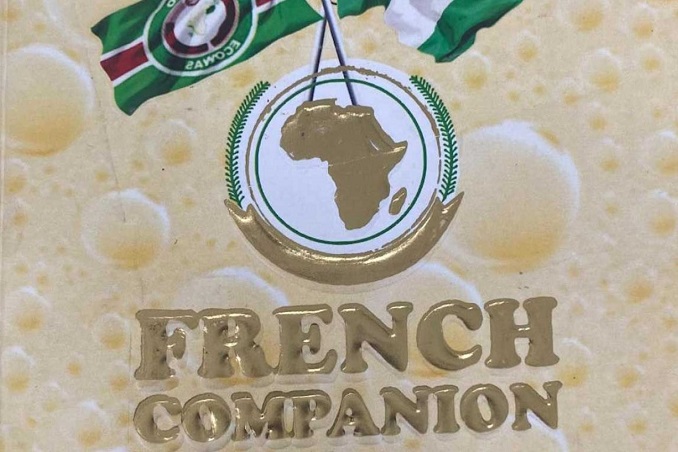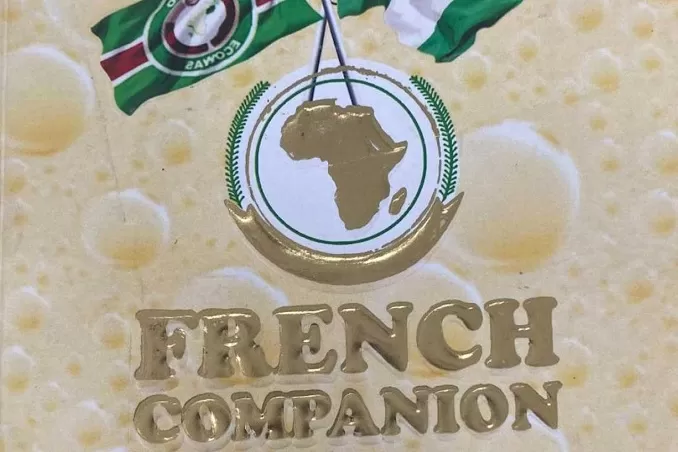

bilingual instruments that are reliable for intra africa business
Last updated on June 11th, 2022 at 06:45 am
Dr. Dare Arokoyo, until recently associate professor and provost of the School of Continuing Education at the Houndegbe North American University in Benin Republic, has written two books, or more appropriately, language communication manuals, for ECOWAS and AfCFTA business travellers and French Companion for African Economic Community.
Both publications were created with the goal of allowing English-speaking Africans to communicate pretty well in French with fellow Africans in routine day-to-day interactions and, more importantly, in the conduct of business. They are written with “simplicity and a conversational style” in mind. ‘You don’t even need a background understanding of French to use it conveniently,’ Dare explains (these manuals).
The English-French Companion for ECOWAS is a 272-page work that walks the user through the basics of greeting and self-introduction, to asking for directions, service requests of all kinds, describing people and things, interactions with border officials and hotel staff, and, most importantly for the professional and business person, product and service marketing. It also includes a 54-page ‘Bilingual Glossary of Business Terms,’ which is organised alphabetically.
The AfCFTA Business Travelers and French Companion for the African Economic Community is a 322-page book that, in addition to serving as a bilingual guide, provides a thorough introduction to and argument for a much-needed functional platform for continental trade. A 40-page ‘Bilingual Glossary of Business Terms’ is also available.
It’s crucial to note right away that Dr. Arokoyo’s primary objective, and rightly so, is to produce manuals that make the linguistic aspect of ‘ease of doing business’ between and among African countries easier. As a fluent speaker and writer in both English and French, he understands the unquestionable value and benefits of bilingualism both within and beyond Africa, as well as the unquantifiable limitations that non-bilingualism puts on a traveller (for whatever reason) throughout the continent.
Language is the medium through which people communicate; multilingualism is the medium through which people engage across boundaries and cultures. The author is correct in believing that strengthening bilingualism is critical, particularly for the highly desirable, long sought after, but so far elusive economic integration of Africa.
French is spoken by 141 million people in 34 African countries, while English is spoken by 130 million people in 25 countries. Both languages are widely used in political and corporate discourses around the world, as well as two of the most commonly used languages on the Internet and two of the working languages of international organisations.
Given the “political and economic strengths” of French and English, any genuine African entrepreneur looking to operate and succeed across borders must be bilingual. A bilingual African political player, on the other hand, may have an advantage in communicating (in the fullest sense of the word) with the majority of his colleagues across the continent.
Dr. Arokoyo is correct in his assertion that “political and economic actors [armed] with multilingual communication capacity [are significantly better suited] to engage in inter-lingual territorial mobility for export promotion, services….”
Since the creation of the Organization of African Unity (OAU) in 1963, Africa’s economic integration for the sake of continental development has been a topic of discussion. It is a fundamental goal of successive continental organisations, such as the Lagos Plan of Action for Economic Development (1980-2000), the African Economic Community (1991), and, more recently, the African Continental Free Trade Area (AfCFTA) (2002). Regional organisations, such as the 15-member Economic Community of West African States (ECOWAS) (1975), have been developed across Africa over time and for a similar objective.
Art has the potential to take the talents from any regions across the globe, and this world has witnessed one…
Thousand of users worldwide face a discontinuation of WhatsApp services on older Android versions as Meta has officially announced this…
Disaster teams in KwaZulu-Natal stand ready to respond to persistent rainfall while drivers should approach roads with care. According to…
Starlink the satellite internet company by Elon Musk is growing fast in Africa. It now works in more than 20…
Chinese production companies directly offer their luxury products at wholesale rates online because they were created for luxury retailers. Social…
Cricket South Africa reveals a new ODI squad for 2023 competitions as Proteas women's team and presents fresh players alongside…
This website uses cookies.